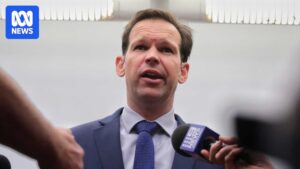
Controversial US right-wing commentator Candace Owens has been denied entry to Australia after the nation’s highest court upheld the rejection of her visa application. The decision, announced in October 2024, follows Home Affairs Minister Tony Burke’s refusal to grant Owens a visa, citing concerns that her presence could “incite discord” during a planned speaking tour.
Owens had argued that the visa rejection violated the implied freedom of political communication. However, Minister Burke blocked her application on the grounds that he “reasonably suspected” she failed to meet the character test. He expressed concerns that her “controversial and conspiratorial views” posed a risk of inciting discord within the Australian community, which he deemed contrary to the national interest.
Legal Battle and High Court Ruling
In a legal battle that reached the High Court, Owens’ lawyers contended that the character test used to assess visa applications disproportionately affected those with non-mainstream political views. Perry Herzfeld SC argued that the threshold for “inciting discord” was overly broad, potentially encompassing mere disagreements and robust debates.
“The threshold of ‘inciting discord’ to reject a visa on character grounds is so broad it could capture disagreements and robust debates and is ‘very much in the eye of the beholder’,” Herzfeld stated during the May hearing.
Despite these arguments, the High Court found the visa refusal justified, ruling that it did not infringe upon the implied freedom of political communication. The court’s decision was deemed valid, and Owens was ordered to cover the Commonwealth’s legal costs.
Concerns Over Owens’ Views
Minister Burke’s decision took into account Owens’ public statements and social media activity, which have been criticized for targeting Muslim, Black, Jewish, and LGBTQI communities. Her comments downplaying the Holocaust and alleging that Muslims initiated slavery were cited as particularly concerning.
“Australia’s national interest is best served when Candace Owens is somewhere else,” Burke remarked at the time of the visa refusal.
The Commonwealth argued that Owens’ presence in Australia could potentially encourage extremist behavior, vilify segments of the community, or incite civil unrest, thereby constituting an unacceptable risk.
Historical Context and Expert Opinions
This case highlights the ongoing debate over the balance between freedom of speech and national security. Experts note that Australia has historically exercised strict control over visa issuances to individuals whose views are seen as potentially harmful to social cohesion. This approach is not unique to Australia, as many countries grapple with similar challenges in an increasingly polarized global landscape.
Solicitor-General Stephen Donaghue KC emphasized that the “incite discord” criterion is intended to address severe cases, underscoring the gravity of the concerns surrounding Owens’ potential impact.
“The ‘incite discord’ threshold to reject a visa on character grounds was intended to cover the more serious end of the spectrum,” Donaghue explained during the court proceedings.
Implications and Future Considerations
The High Court’s decision sets a precedent for how Australia may handle similar cases in the future, reinforcing the government’s stance on maintaining social harmony. As Owens commands a substantial online following, with over 4.2 million YouTube subscribers and 5.7 million Instagram followers, the ruling also underscores the influence of digital platforms in shaping public discourse and policy decisions.
While Owens’ supporters argue that her exclusion represents a suppression of free speech, the Australian government maintains that safeguarding national interest and community welfare takes precedence. This case may prompt further discussions on the criteria used to evaluate visa applications and the broader implications for political expression and international relations.
As the global conversation on free speech and public safety continues, the outcome of Owens’ case may serve as a reference point for policymakers and legal experts navigating these complex issues.






